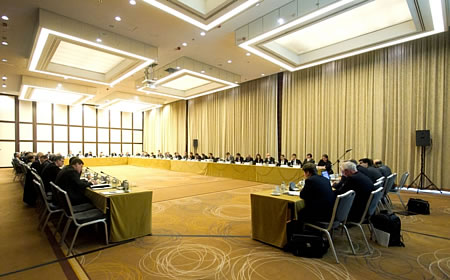Non-Strategic Nuclear Weapons Discussed in Warsaw

The conference was held in this elaborate room at the Intercontinental Warsaw hotel.
By Hans M. Kristensen
In early February, I participated in a conference in Warsaw on non-strategic nuclear weapons. The conference was organized by the Polish Institute of International Affairs, the Norwegian Institute for Defense Studies, and the Carnegie Endowment for International Peace. It was supported by the Ministry of Foreign Affairs of Norway and the Ministry of Foreign Affairs of Poland, with the participation of the U.S. State Department.
The conference had very high-level government representation from the United States and NATO, and included non-governmental experts from the academic and think-tank communities in Russia and NATO countries. The Russian government unfortunately did not send participants.
The United States and NATO want to broaden the arms control agenda to non-strategic nuclear weapons, which have so far largely eluded limitations and verification. The objective of the conference was to try to identify options for how NATO and Russia might begin to discuss confidence-building measures and eventually limitations on non-strategic nuclear weapons.
The conference commissioned eight working papers to form the basis for the discussions. My paper, which focused on identifying common definitions for categories of non-strategic nuclear weapons, recommended starting with air-delivered weapons as the only compatible category for negotiations on U.S-Russian non-strategic nuclear weapons.
Background: Working papers and lists of participants are available on the PISM web site. For background on non-strategic nuclear weapons, see this FAS report.
This publication was made possible by a grant from the Ploughshares Fund. The statements made and views expressed are solely the responsibility of the author.
The last remaining agreement limiting U.S. and Russian nuclear weapons has now expired. For the first time since 1972, there is no treaty-bound cap on strategic nuclear weapons.
The Pentagon’s new report provides additional context and useful perspectives on events in China that took place over the past year.
Successful NC3 modernization must do more than update hardware and software: it must integrate emerging technologies in ways that enhance resilience, ensure meaningful human control, and preserve strategic stability.
The FY2026 National Defense Authorization Act (NDAA) paints a picture of a Congress that is working to both protect and accelerate nuclear modernization programs while simultaneously lacking trust in the Pentagon and the Department of Energy to execute them.